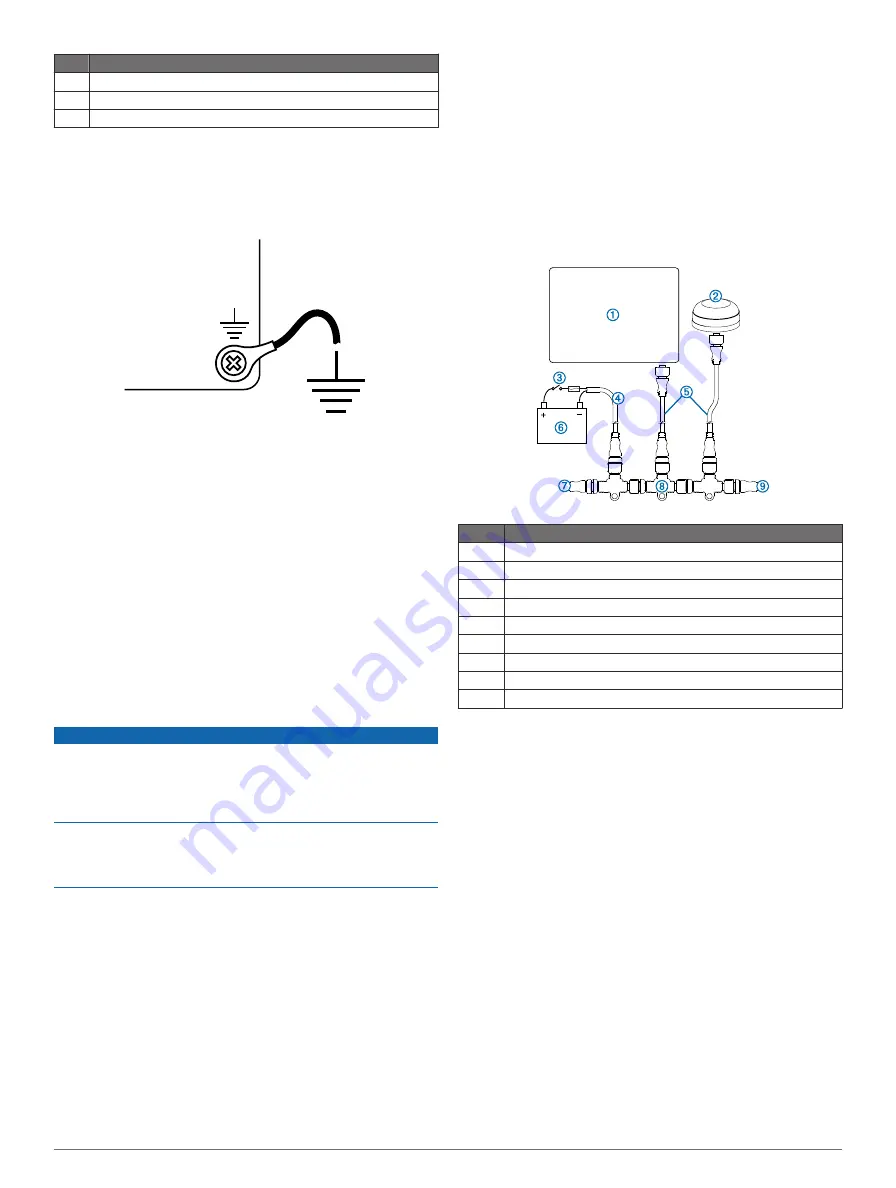
Item Description
Ä
Battery
Å
8 in. (20.3 cm)
Æ
36 ft. (11 m) maximum extension
Additional Grounding Considerations
This device should not need any additional chassis grounding in
most installation situations. If interference is experienced, the
grounding screw on the housing can be used to connect the
device to the water ground of the boat to help avoid the
interference.
Garmin Marine Network Considerations
This device can connect to additional Garmin Marine Network
devices to share data such as radar, sonar, and detailed
mapping. When connecting Garmin Marine Network devices to
this device, observe these considerations.
• A Garmin Marine Network cable must be used for all Garmin
Marine Network connections.
◦ Third-party CAT5 cable and RJ45 connectors must not be
used for Garmin Marine Network connections.
◦ Additional Garmin Marine Network cables and connectors
are available from your Garmin dealer.
• There are four NETWORK ports on the device that each act
as a network switch. Any compatible device can be
connected to any NETWORK port to share data with all
devices on the boat connected by a Garmin Marine Network
cable.
NMEA 2000® Considerations
NOTICE
If you have an existing NMEA 2000 network on your boat, it
should already be connected to power. Do not connect the
included NMEA 2000 power cable to an existing NMEA 2000
network, because only one power source should be connected
to a NMEA 2000 network.
If you are installing the included NMEA 2000 power cable, you
must connect it to the boat ignition switch or through another in-
line switch. NMEA 2000 devices will drain your battery if the
NMEA 2000 power cable is connected to the battery directly.
This device can connect to a NMEA 2000 network on your boat
to share data from NMEA 2000-compatible devices such as a
GPS antenna or a VHF radio. The included NMEA 2000 cables
and connectors allows you to either connect the device to your
existing NMEA 2000 network or create a basic NMEA 2000
network if needed.
If you are unfamiliar with NMEA 2000, you should read the
“NMEA 2000 Network Fundamentals” chapter of the
Technical
Reference for NMEA 2000 Products
on the included CD-ROM
or click the “Manuals” link on the product page for your device at
The port labeled NMEA 2000 is used to connect the device to a
standard NMEA 2000 network. The ports labeled ENGINE and
HOUSE are reserved for future use and should not be
connected to a standard NMEA 2000 network.
Item
Description
À
NMEA 2000-compatible Garmin device
Á
GPS antenna
Â
Ignition or in-line switch
Ã
NMEA 2000 power cable
Ä
NMEA 2000 drop cable
Å
12 Vdc power source
Æ
NMEA 2000 terminator or backbone cable
Ç
NMEA 2000 T-connector
È
NMEA 2000 terminator or backbone cable
NMEA 0183 Connection Considerations
• The installation instructions provided with your NMEA 0183-
compatible device should contain the information you need
to identify the transmitting (Tx) and receiving (Rx) A (+) and
B (-) wires.
• When connecting NMEA 0183 devices with two transmitting
and two receiving wires, it is not necessary for the NMEA
2000 bus and the NMEA 0183 device to connect to a
common ground.
• When connecting a NMEA 0183 device with only one
transmitting (Tx) wire or with only one receiving (Rx) wire,
the NMEA 2000 bus and the NMEA 0183 device must be
connected to a common ground.
Basic NMEA 0183 Connections
These diagrams illustrate basic NMEA 0183 wiring used to connect your device to NMEA 0183-compliant devices. For more
information on the NMEA 0183 capabilities of the device, see
6
































